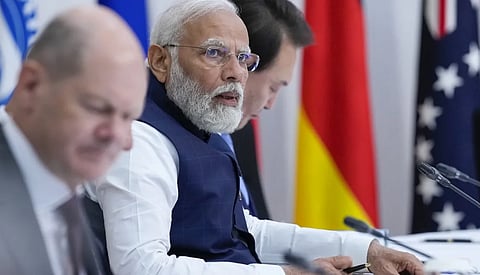
- Home
- Live Blog
- Breaking News
- Top Headlines
- Cities
- NE News
- Sentinel Media
- Sports
- Education
- Jobs

Madhurjya Saikia
(He can be reached at madhurjyatu15@gmail.com)
The Group of Seven (G7) is a forum for political and economic collaboration among seven major advanced economies: Canada, France, Germany, Italy, Japan, the United Kingdom, and the United States. The European Union (EU) also participates as a non-enumerated member. The G7 was founded on shared principles of pluralism, liberal democracy, and representative governance for the greater good. The G7 operates without a formal treaty and lacks a permanent secretariat or office. Its organization is managed through an annually rotating presidency among the member countries. The country holding the presidency sets the agenda and hosts the summit for that year. The G7 was established in 1975 in response to oil shocks and economic crises. Over time, its objectives have expanded to cover a wider array of global challenges, including international economic policies, security concerns, technological progress, and climate change.
Over the years, the G7 has expanded its focus from mainly economic issues to a wide range of global challenges, including trade, security, climate change, and technological advancements like artificial intelligence. The G7 has worked together to support global economic recovery, address health emergencies like the COVID-19 pandemic, and respond to geopolitical conflicts such as the Russian invasion of Ukraine. The group coordinates economic policies, tackles trade imbalances, and enhances financial regulations. It also addresses security issues by combating terrorism and improving cyber security. Climate change is a key focus, with efforts to reduce carbon emissions and promote sustainable development supporting agreements like the Paris Agreement. Health initiatives, especially during the COVID-19 pandemic, have aimed at ensuring vaccine access and improving healthcare systems. Additionally, the G7 promotes technological innovation and the growth of the digital economy, addressing new challenges like artificial intelligence through initiatives such as the “Hiroshima AI Process.”
The G7 can play a crucial role in helping India achieve its global goals by promoting economic growth, security, and sustainable development. Collaborating economically with G7 countries can attract investments, enhance trade, and advance technological progress in India. Working together on financial regulations and trade policies can boost India’s economic stability and its integration into the global market. In terms of security, cooperation with the G7 can aid India in fighting terrorism, improving cybersecurity, and managing regional conflicts. Sharing intelligence and security strategies can strengthen India’s defence capabilities and contribute to regional peace. The G7 also played a key role in the creation of international financial institutions like the Financial Action Task Force (FATF). For sustainability, the G7’s support for climate initiatives can assist India in adopting greener energy, cutting carbon emissions, and executing sustainable development projects. Additionally, accessing G7-led technological innovations, such as artificial intelligence, can drive India’s tech industry and enhance its global competitiveness by attracting global financial investment. Now, the move to invite India, Australia, South Africa, and South Korea to this can be seen as a possible step towards the upgrade of the G-7 to a G-11. The idea of a G-11 can also emerge as a global democratic coalition, and India is at the very heart of this narrative. Further, the proposed G-11 grouping would recognise India’s place among the world’s richest nations and acknowledge its global voice.
The 50th G7 summit was held from June 13 to 15, 2024, at Borgo Egnazia in the city of Fasano in Apulia, Italy. The theme of the G7 Summit 2024 centres on “Building a Resilient and Inclusive Global Economy.” It highlights the summit’s emphasis on facilitating economic recovery after the pandemic, advancing inclusive growth, tackling climate change, and strengthening international cooperation. India also participated in the G7 outreach session on Artificial Intelligence, Energy, Africa, and the Mediterranean. The G7 also launched the Apulia Food Systems Initiative (AFSI), aimed at overcoming structural barriers to food security and nutrition. Additionally, the G7 announced the Partnership for Global Infrastructure Investment (PGII), a joint initiative to mobilize up to USD 600 billion by 2027 for infrastructure projects in developing countries through public and private investments. Furthermore, plans were revealed to develop a brand in support of implementing the International Code of Conduct for Organizations Developing Advanced AI Systems.
India’s collaboration with the G7 promises extensive potential across multiple domains. India’s expansive market and burgeoning middle class present ample opportunities for trade and investment with G7 countries. In fields like IT, space exploration, and renewable energy, India’s advancements can stimulate joint efforts in innovation and sustainability. Geopolitically, India’s strategic location and adherence to democratic principles position it as a pivotal player in ensuring regional stability and advocating for global governance reforms. India’s participation in the G7 signifies a move towards a more inclusive global economic framework, underscoring its growing influence and commitment to multilateral cooperation. Nevertheless, addressing challenges such as economic inequalities, environmental issues, and geopolitical complexities will necessitate sustained dialogue and collaborative initiatives between India and the G7. By leveraging complementary strengths and addressing common concerns, India and the G7 can build a common future characterized by enhanced cooperation, sustainable development, and shared prosperity on a global scale.